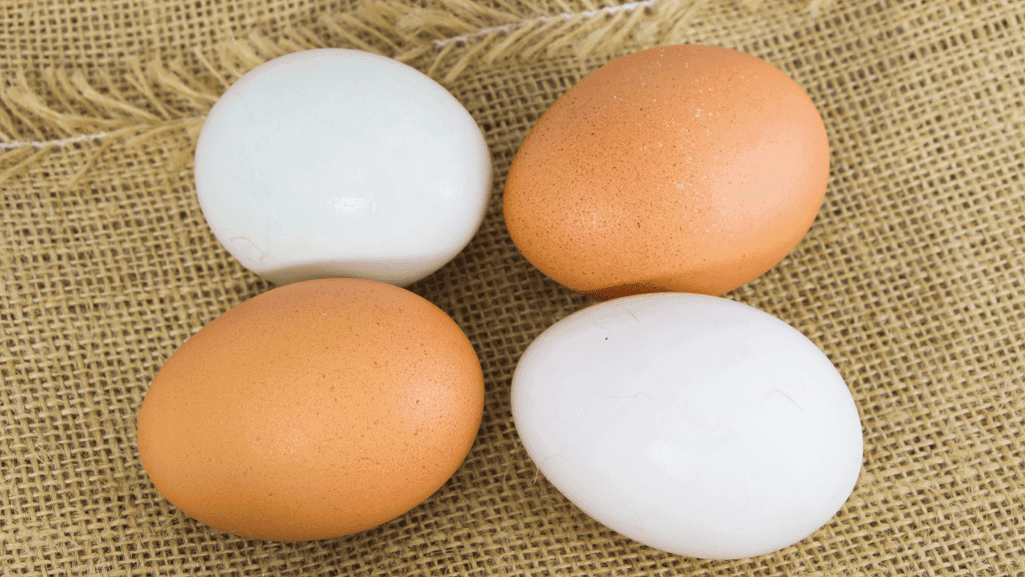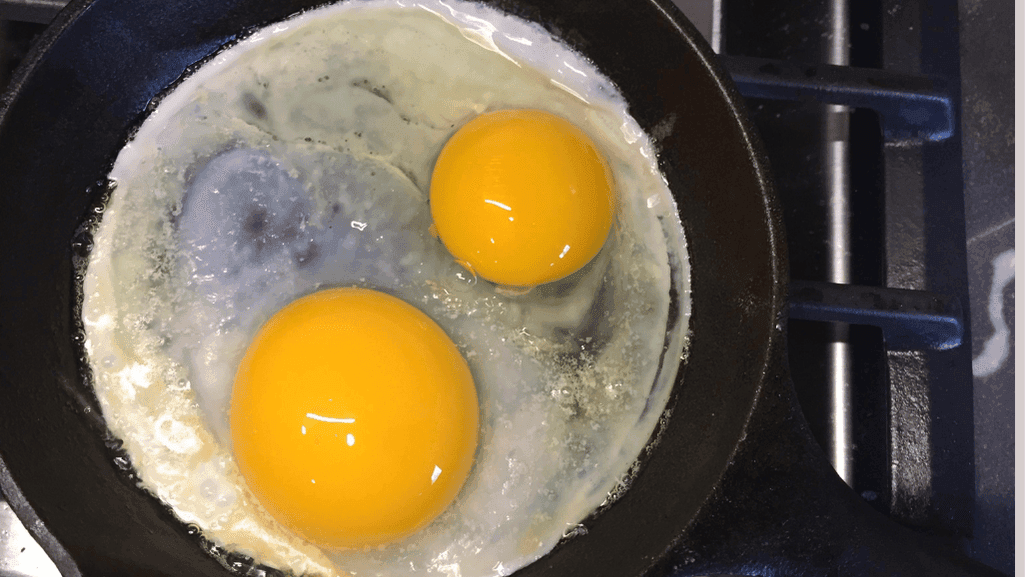Start a journey of nutritional discovery with farm fresh eggs. They show the debate of which is better duck eggs or chicken eggs. Eggs are known for being a good source of protein and are affordable. While chicken eggs are common, duck eggs are gaining popularity worldwide for their nutritional value.
Duck eggs are about 50% larger than chicken eggs. They are packed with nutrients, making them a great choice for a healthy diet. Expert insights highlight the benefits of duck eggs. They promise to enhance your cooking and improve your health.
Key Takeaways
- Duck eggs, weighing around 3.5 ounces, pack a larger size compared to chicken eggs which tend to be around 2.5 ounces.
- Rich in omega-3 fatty acids, duck eggs contain 71 milligrams, doubling the amount found in a chicken egg, and can support heart and joint health.
- While duck eggs boast twice the fat and cholesterol, they offer a substantial nutritional boost with 130 calories and 9 grams of protein per egg.
- Rarity and nutritional value often translate to a higher cost, with duck eggs priced up to $12 per dozen, often found in specialty stores and farmers’ markets.
- The health benefits of these organic eggs aren’t just confined to protein and fat; duck eggs are a treasure trove of B vitamins and trace minerals, fortifying mental and skin health.
- Despite the richer nutrient content, dietary guidelines suggest moderating duck egg intake, especially for those with certain health concerns.
Introduction to Duck Eggs and Chicken Eggs
Exploring the difference between duck eggs and chicken eggs reveals many interesting facts. These include their nutritional content and how they can be used in cooking. Duck eggs are becoming more popular, leading to questions about their effect on dietary preferences and how they compare to chicken eggs in terms of nutritional value.
Duck eggs are bigger than chicken eggs, with a richer flavor and thicker shell. This makes them last longer. They also have a bigger yolk, which is not only more appealing but also has more nutrients like folate, iron, and vitamin B12.
Duck eggs have more calories and fat than chicken eggs. They have 223 calories, 12 grams of protein, and 18.5 grams of fat per 100 grams. This means they have 276% of the Daily Value (DV) of cholesterol. On the other hand, chicken eggs have fewer calories, protein, and fat, and less cholesterol.
Duck eggs are also packed with choline and dietary cholesterol. These are important for brain development and overall health. However, it’s important to eat them in moderation because of their high cholesterol and potential health risks.
Choosing between duck eggs vs chicken eggs can be a big decision. It depends on your nutritional needs, cooking preferences, and health goals. Both types of eggs are versatile and popular in many cuisines. The choice between them affects not just taste but also your health.
Nutritional Comparison of Duck Eggs and Chicken Eggs
Looking at the nutritional differences between duck and chicken eggs is key for those who care about their health. Knowing about protein, cholesterol, and vitamins and minerals helps make better food choices. These choices can help reach health goals.
Protein Content and Muscle Building
Duck and chicken eggs are both great for protein, which is important for muscles. Duck eggs have a bit more protein, with 12.8 grams per 100 grams. Chicken eggs have 12.6 grams. This makes duck eggs better for building muscle and strength.
Cholesterol and Heart Health
Cholesterol levels are important when eating animal products like eggs. Duck eggs have a lot more cholesterol, with 619 mg per egg. Chicken eggs have 186 mg. But, eating eggs in moderation might actually help your good cholesterol levels. This could lower the risk of heart disease.
Vitamins and Minerals at a Glance
Duck and chicken eggs have different vitamins and minerals. Duck eggs have more vitamin A, vitamin E, vitamin K, and folate. Chicken eggs have more vitamin D and choline. These nutrients are good for your eyes, bones, and brain. Eating eggs can be good for your health.
Knowing these differences helps make better food choices. It also supports sustainable practices and learning about eggs. Whether you choose duck or chicken eggs, they offer many health benefits.
The Taste Difference and Culinary Uses
Exploring the taste difference between duck and chicken eggs shows why duck eggs are preferred. Duck eggs vs chicken eggs taste richer. They have more fat and a bigger yolk, making them great for duck egg recipes.
Duck eggs for baking make a big difference. They add moisture and fluffiness to baked goods. Chefs and home bakers find cakes and breads better with duck eggs.
Duck eggs also have a thicker shell. This means they last longer, which is good for storing.
Here’s a look at why duck eggs might be better in your kitchen:
| Aspect | Duck Eggs | Chicken Eggs |
|---|---|---|
| Protein Content (per 100g) | 13 grams | 12 grams |
| Fat Content (per 100g) | 18.5 grams | 11 grams |
| Calories | 223 kcal | 149 kcal |
| Cholesterol | 619 mg | 186 mg |
| Shelf Life | Longer due to thicker shell | Shorter |
An article on MedicineNet talks about duck eggs’ nutritional benefits. They have more Vitamin B12 and selenium, making them creamier. For more ideas, check out Duck’s New World.
Duck eggs are a great choice for cooking, whether it’s taste or utility.
Duck Eggs: A Powerhouse of Omega-3 Fatty Acids
Duck eggs are packed with omega-3 fatty acids, almost three times more than chicken eggs. This makes them great for heart health, reducing inflammation, and improving joint health. Learn more about the health benefits and why duck eggs are nutritionally superior.
Benefits for Heart Health
Duck eggs are rich in omega-3 fatty acids, which are key for heart health. These fats help keep the heart beating right and lower blood pressure. This can greatly lower the risk of heart disease.
Impact on Inflammation and Joint Health
The omega-3 fatty acids in duck eggs fight inflammation. This can help improve joint health. Duck eggs are a great choice for those with joint pain or conditions like arthritis.
| Nutrient | Duck Eggs | Chicken Eggs |
|---|---|---|
| Omega-3 Fatty Acids | Significantly Higher | Lower |
| Vitamin A | 1328 µg | 540 µg |
| Iron | 3 times more | Less |
| Vitamin B12 | 5 times more | Less |
| Folate | 80 µg | 47 µg |
Duck eggs have a remarkable nutritional profile. Adding them to your diet can boost your health, especially for your heart and fighting inflammation.
Cooking Differences: Duck Eggs vs Chicken Eggs in Recipes
Choosing between duck eggs vs chicken eggs for baking or cooking brings unique benefits. Both types of eggs have special qualities that chefs and home cooks should know about.
Cooking with duck eggs often results in richer flavors and better textures. Duck eggs have more fat and protein, making them great for baking. They add a lot of taste and texture to baked goods. For more on using duck eggs in cooking, see rich and creamy duck eggs.
When using chicken egg recipes with duck eggs, don’t just swap them one for one. Duck eggs are bigger and more nutritious, so two duck eggs can replace three chicken eggs. This keeps the recipe balanced and prevents it from getting too wet or too thick.
- Recipes benefit from the larger yolk and higher fat content of duck eggs, aiding in richer, creamier textures.
- Duck eggs have a longer shelf life, which provides more flexibility in storage and usage timings for recipes.
| Nutrient | Duck Egg (per egg) | Chicken Egg (per egg) |
|---|---|---|
| Calories | 130 | 70 |
| Fat (g) | 10 | 5 |
| Protein (g) | 9 | 6 |
| Cholesterol (mg) | 619 | 210 |
| Omega-3s | Higher | Lower |
In baked goods like meringues and soufflés, duck eggs are a game-changer. They add more volume and texture, making them perfect for baking. Their clear, thicker whites also whip up fluffier, which is why many bakers prefer them.
Duck eggs are not just tasty; they’re also healthier. They have more omega-3s, vitamins, and minerals. But, they do have more cholesterol and fat. Still, their rich taste and extra nutrition make them a great choice for cooking.
Understanding Egg Size and Shell Color Differences
When deciding between duck eggs and chicken eggs, people often ask which is better. The egg size difference and shell color differences are key. These factors affect how eggs are used in cooking and their nutritional value.
Egg Size Difference and Its Implications
Duck eggs are bigger than most chicken eggs. They weigh between 2.5 to 3.5 ounces, making them “Jumbo” size. Chicken eggs, on the other hand, weigh about 2 ounces, or Grade Large.
This egg size difference means duck eggs have a bigger yolk-to-white ratio. This makes them taste better and have more nutrients like omega-3 fatty acids and protein.
Shell Color Variations
The shell color differences between duck and chicken eggs are clear. But, they don’t really change the taste or nutrition. Duck eggs can be white to dark blue, while chicken eggs are white to light brown.
These colors can make dishes look nicer. But, the thick shells of duck eggs are more useful. They last longer and break less often.
Learn more about the nutritional value of duck compared to chicken eggs.
| Feature | Duck Eggs | Chicken Eggs |
|---|---|---|
| Average Weight | 2.5 to 3.5 ounces | 2 ounces |
| Protein Content | 9 grams | 6 grams |
| Cholesterol Content | About 600 mg | 200 mg |
| Fat Content | 9.6 grams | 5 grams |
| Omega-3 Fatty Acids | 71.4 mg | 37 mg |
| Shelf Life/Shell Strength | Longer/Stronger | Shorter/Less strong |
The table shows duck eggs have more nutrients than chicken eggs. But, they also have more cholesterol. Choosing between duck and chicken eggs depends on personal taste, diet, and cooking needs.
Health Benefits of Duck Eggs: Boosting Mental and Skin Health
Duck eggs are a great choice for your diet. They are bigger than chicken eggs and packed with nutrients. These nutrients help your brain and skin stay healthy.
The Role of Selenium and B-Vitamins
Duck eggs have a lot of Selenium, which is good for your brain. They also have B-vitamins that help you feel less stressed and more focused. Eating duck eggs can make your brain work better.
Duck Eggs for Better Skin Health
Duck eggs are also good for your skin. They have biotin and B-complex vitamins that keep your skin hydrated and elastic. They also protect against skin problems like eczema and acne.
When you compare duck eggs to chicken eggs, duck eggs win in many ways. They offer more benefits for your brain and skin. Duck eggs are a great choice for anyone looking to improve their health.
| Nutrient | Duck Eggs (per 100g) | Chicken Eggs (per 100g) |
|---|---|---|
| Calories | 185 | 155 |
| Protein | 13g | 13g |
| Fat | 14g | 11g |
| Vitamin B12 | 90%DV | 23%DV |
| Selenium | 52%DV | 45%DV |
| Lutein and Zeaxanthin | High | Low |
Choosing between duck eggs and chicken eggs depends on your health goals. If you want to improve your brain and skin, duck eggs are a good choice. They offer many health benefits and are a smart choice for those who care about their health.
Adapting to Dietary Preferences with Duck and Chicken Eggs
Whether you follow a diet for health, ethics, or personal reasons, duck and chicken eggs are great options. They meet different dietary needs. Knowing the nutritional value of chicken eggs and duck eggs helps you choose wisely.
Duck eggs are big and taste rich, perfect for Keto and Paleo diets because of their fat and protein. Chicken eggs are common and nutritious, fitting well into many diets.
Looking for organic and farm fresh eggs? Duck eggs are special and found at farmers’ markets or organic stores. Chicken eggs are everywhere, with many organic and free-range options.
| Nutrient | Chicken Egg Content | Duck Egg Content |
|---|---|---|
| Protein (grams) | 6 | 9 |
| Omega-3 Fatty Acids (mg) | 37 | 71.4 |
| Iron (mg) | Less than duck eggs | Higher compared to chicken eggs |
| Vitamin B12 (mcg) | Significantly less than duck eggs | Significantly higher compared to chicken eggs |
| Cholesterol (mg) | 186 | 619 |
Duck and chicken eggs are good choices as dietary preferences change. Duck eggs are great for high-energy diets. Chicken eggs are perfect for everyday meals because they’re balanced and easy to find.
Looking for where to buy duck eggs? Try local farms, specialty stores, and farmers markets. They offer fresh duck and chicken eggs, ensuring your diet is nutritious and ethical.
Choosing the right egg can make your meals healthier and more meaningful. It shows your commitment to your health and values.
Conclusion
Duck eggs and chicken eggs have their own special nutritional profiles. Duck eggs are packed with vitamin B12, selenium, and omega-3 fatty acids. These nutrients are great for our health.
Chicken eggs, on the other hand, have a milder taste and are a staple in many diets. They have less cholesterol and are rich in vitamin D and choline. This makes them perfect for many recipes.
Duck eggs are known for their health benefits, like supporting eye health and the immune system. They are a good choice for those who can’t eat chicken eggs. Even though duck eggs are more expensive and have more calories, their unique taste and texture are worth it.
In the end, both duck and chicken eggs have their own place in a healthy diet. Duck eggs offer a rich, savory flavor, while chicken eggs are versatile and easy to use in cooking. Each type of egg brings something special to the table.













